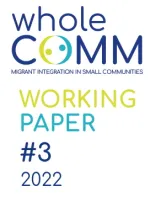Immigrant integration in small and mediumsized towns and rural areas: local policies and policymaking relations in Turkey

Working Paper No. 3 - Turkey
This report looks at multi-level governance dynamics and at the integration policies targeting post-2014 migrants developed by three small and medium-sized towns and rural areas in Turkey. Primarily based on interviews conducted in each of the selected localities, it provides an overview of 1) national and regional integration policies targeting post-2014 migrants in Turkey; 2) policymaking relations among the key actors involved in these policy processes in three localities and key features of policy networks within which these actors interact; 3) how these actors perceive and define integration. The report first touches upon Turkey’ overall legal and policy framework on governance of migration and integration. This overview includes a description of legislation, national policy documentation on integration, legal and institutional capacities and roles of different governmental and non-governmental actors at national and local levels as well as cooperation and coordination mechanisms among these actors. The report finds that the policy framework of Turkey creates certain barriers for policy making relations at the local level and in creating networks among the key actors. The centralized national policy making and governance system in Turkey does not allow local actors to independently develop local policies specific to their contexts. In addition, inconsistencies in national policies that include return-based narratives of politicians and policy makers on the one hand, and integration focused policy and program initiatives on the other, along with the pending temporariness of refuge statuses create confusion among local actors who thus choose to remain on the sideline rather than being proactive. Most importantly, international organizations and civil society organizations play a key role to address the needs that are not met by governmental authorities, while municipalities play a limited role due to limitations of funding and human resources.